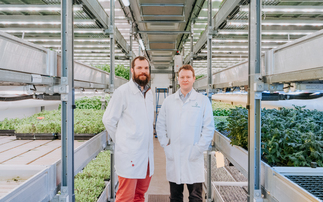Food and drink giant's roadmap includes major focus on scaling up regenerative agriculture across supply chains worldwide as it sets sights on net zero emissions by 2050
Nestlé has today unveiled a multi-billion pound plan to deliver on its science-aligned climate goals over the next decade, with a major focus on scaling up regenerative agriculture techniques, rolling out renewable electricity for its operations, and expanding its plant-based food and drink offerings.
In a detailed roadmap published today, the global food and drink giant said it planned to invest a total of CHF 3.2bn - around £2.7bn - over the next five years, with CHF 1.2bn (£1bn) directed towards regenerative agriculture practices across its supply chains over the next decade.
The investment builds on the Swiss firm's recent adoption of science-based targets to halve emissions by 2030 and reach net zero by 2050. The roadmap sketches out a wide-ranging strategy for how the firm will adjust its operations and agricultural practices over the next decade to drive progress towards these goals.
The plan is focused on three main areas: regenerative agriculture; operations; and product portfolios. The baseline for measuring progress will come from 2018, when Nestlé reported a carbon footprint of 92 million tonnes.
"Tackling climate change can't wait and neither can we," said Mark Schneider, Nestlé CEO. "It is imperative to the long-term success of our business. We have a unique opportunity to address climate change, as we operate in nearly every country in the world and have the size, scale and reach to make a difference. We will work together with farmers, industry partners, governments, non-governmental organisations and our consumers to reduce our environmental footprint."
The strategy foregrounds the importance of "regenerative agriculture" practices, which prioritise improving soil health and maintaining and restoring diverse ecosystems, aiming to counter the habitat destruction caused by deforestation and other damaging practices frequently linked to global agricultural supply chains. To do this, the firm claims to work with more than 500,000 farmers and 150,000 suppliers, incentivising them by purchasing their goods at a premium, buying larger quantities, and co-investing in necessary capital expenditure.
The roadmap commits the firm to sourcing 20 per cent of its ingredients through regenerative agriculture by 2025, and 50 per cent by 2030, at which point it expects to source more than 14 million tonnes of its ingredients through regenerative agriculture. In addition, it plans to scale up its reforestation program, with a goal to plant 20 million trees over the coming decade in regions where Nestlé sources its ingredients, in order to sequester carbon, boost biodiversity, and create more shade for crops.
The firm has also committed to being deforestation-free by 2022, although its previous goals in this area lines have proven challenging to meet.
Secondly, in its operations, the roadmap outlines Nestlé's intention to complete the transition of its 800 sites in 187 countries to 100 per cent renewable electricity within the next five years. It also commits the company to offsetting business travel by 2022, implementing water protection meausures, tackling food waste, and switching its global vehicle fleet to greener models.
The third pillar of Nestlé's climate strategy involves the transformation of its product portfolio, as the firm continues to expand its offering of plant-based food and beverages. As part of this, it is working to create a raft of 'carbon neutral' brands, aiming to make Garden Gourmet, Nespresso, San Pellegrino, Perrier, and Acqua Panna fully 'carbon neutral' by 2022, followed by Sweet Earth and Nestlé water products by 2025.
"The board recognises the strategic importance of taking decisive measures to address climate change," said Nestlé chairman Paul Bulkce. "It supports accelerating and scaling up our work to ensure the long-term success of the company and to contribute to a sustainable future for generations to come."







